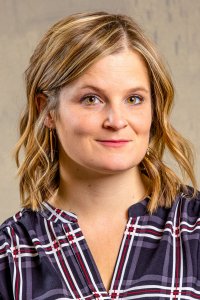Spotlighting Abuse
Ohio Wesleyan Professor’s NYT Essay Calls for All Partner Violence Victims to be Helped, Heard

Intimate partner violence is epidemic in the United States, Amy Butcher writes in this week’s New York Times. “We just don’t always hear about it,” says the Ohio Wesleyan University associate professor and director of Creative Writing.
Sometimes, Butcher shares, abuse is kept secret by those endure it because of fear of stereotypes and shame – a situation with which she is personally familiar.
“Seven years ago, I was in a relationship that was lovely, except for when it wasn’t,” Butcher shares in her New York Times guest essay, “I Know All Too Well How a Lovely Relationship Can Descend Into Abuse.”
Butcher’s essay hinges on an incident during a vacation out West when she spent hours fearing for her life.
“I didn’t tell anyone about it then because I was embarrassed that the person I loved was someone who could be so cruel to me,” Butcher writes. “I thought I could hide this shame by displaying a curated version of my life on social media — photos of the rocks we climbed in Joshua Tree or the yucca palms we split in two to act as natural desert disinfectant.”
But, Butcher shares, about 25 percent of women and 10 percent of men are victims of sexual violence, physical violence, or stalking by an intimate partner, with the majority of women first affected before age 25.
Like much of America, Butcher was captured by the media’s recent coverage of Gabrielle Petito’s disappearance and subsequent death. Petito also was touring the U.S. West when she lost her life, allegedly to intimate partner violence.
And while “we are riveted by stories about white women in peril,” Butcher continues in her New York Times essay, “the risk of this violence is significantly greater if you are a woman of color. … The risks are also high for Americans who identify as L.G.B.T.Q.”
In her essay, Butcher advocates for policy and law enforcement reform to provide help to vulnerable women before they ever need to be found. In particular, she writes, immigration reform would help protect women who fear their immigration status will be used against them if they report a crime or take their partner to court.
Butcher also suggests social workers accompany police responding to incidents of domestic violence to help de-escalate conflicts and guide those in danger to safe shelters. It is vital, she states, that missing persons and domestic violence cases receive “the same heightened level of media coverage, the same allocation of resources, the same deployment of law enforcement” as seen in Petito’s case, regardless of how the victim identifies.
“It is important we learn their names, too,” Butcher concludes in the essay. “And it is absolutely vital that we hear their stories.”
Butcher joined the Ohio Wesleyan faculty in 2014 and holds a Master of Fine Arts degree from the University of Iowa.
Her forthcoming book, “Mothertrucker,” set for release Nov. 1, continues to explore America’s silent epidemic of intimate partner violence. The book already has received praise from Kirkus Reviews and Publisher’s Weekly, and early excerpts earned an Individual Excellence Award from the Ohio Arts Council.
Publisher’s Weekly calls the book “tender and gripping,” stating, “[Mothertrucker] explores myriad issues with nuance and grace, including Indigenous rights, violence against women, religious hypocrisy, and environmental concerns.” Kirkus Reviews calls the book “a searching and deeply empathetic memoir” and “a sobering reflection on verbal and psychological abuse,” noting, “Butcher’s book honors the healing power of female friendship and questions the nature of divinity beyond its constricting patriarchal manifestations.”
Butcher also is the author of “Visiting Hours: A Memoir of Friendship and Murder,” and her essays have appeared in outlets including Harper’s, The New York Times, Granta, The Washington Post, The Denver Post, The American Scholar, and Lit Hub.
Learn more about Butcher, Ohio Wesleyan’s Department of English, and its creative writing concentration at owu.edu/English.
Founded in 1842, Ohio Wesleyan University is one of the nation’s premier liberal arts universities. Located in Delaware, Ohio, the private university offers more than 70 undergraduate majors and competes in 24 NCAA Division III varsity sports. Through its signature program, The OWU Connection, Ohio Wesleyan teaches students to integrate knowledge across disciplines, build a diverse and global perspective, and apply knowledge in real-world settings. Ohio Wesleyan is featured in the book “Colleges That Change Lives” and included on the U.S. News & World Report and Princeton Review “Best Colleges” lists. Learn more at owu.edu.
